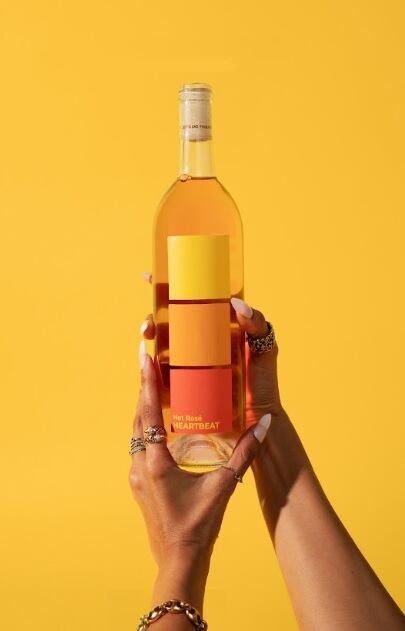The wine industry is propped up by older drinkers: and – as a category firmly rooted in tradition – struggles to appeal to experience-seeking millennials and zany Gen Z.
And while messing with tradition might feel sacrilegious to some, Knapp argues dramatic change is what’s needed to attract drinking age Gen Z-ers to the category.
Spice girls: Female winemaking duo

Kristen Knapp partnered with woman winemaker Gianna Fugazi (former Flowers winemaker and the force behind two Maker Wine collaborations) in 2020 to start work on Heartbeat.
Instead of flavoring or infusing flavors like traditional wines, Heartbeat ferments fresh peppers to create a proprietary pepper-based wine, which is then blended back into the California rosé for an elevated flavor profile.
Each 750mL bottle is 11.7% ABV, 103 calories, and contains no sugar or artificial flavors.
And spice was an obvious choice to Knapp – herself a spicy cocktail lover. Spice is trending among younger consumers: TikTok has over 10 million impressions of users dropping jalapeños into their rosé glasses, proving a strong thirst for innovation and obsession with spice within the Gen Z and Millennial demographics.
And from shots of Fireball to spicy margaritas, there is a rising popularity of spice-infused alcohol.
However, while spice might be the key differentiator and selling point, Knapp says her product is still fundamentally recognizable as a wine.
“The kick is comparable to a spicy margarita, drinkable and refreshing,” she told us. “What’s so unique about this product is that it’s completely rose-forward, and the kick doesn’t roll in until the finish, leaving your mouth salivating and wanting more.”
Creating this balance of spice and wine, however, was not the easiest of tasks. “It’s tough with wine, because it’s a product that constantly changes; at each phase leading up to bottling you need to retest and recalibrate,” she continued. “We’re happy with where we’re starting because it’s an incredibly approachable product.”
The wine is currently available for purchase direct-to-consumer for $21.99 and is rolling out to Los Angeles-based stores and restaurants.
That will inform future development: “Customer feedback is going to be our main driver of how we make the next batch,” says Knapp.
Embracing change
A 2021 Harris Poll asked the question, ‘If you were invited to a party and asked to bring an alcoholic beverage, what would it be?’
Wine was heavily preferred by those over 65 (49% of this cohort said they would choose wine). The other cohorts scored 20% lower, with the 21-24 year old cohort the least likely to favor wine. And the wine industry hasn't been doing much to change this - taking a ‘passive approach’ to attracting younger consumers.
Shaking up marketing strategies is one way to appeal to millennials and Gen Z. But Knapp believes the problem for wine is more fundamental: while other alcohol categories embrace change, wine embraces tradition.
And tradition isn't a great selling point for Gen Z: particularly given the array of beverages vying for their attention (think hard seltzers, FMBs, canned cocktails, craft beer…)
“Heartbeat Hot Rosé opens up the category to more people, like cocktail drinkers looking for a low-sugar option, seltzer drinkers looking for more freshness and flavor, and of course, rosé drinkers who never get anything new,” said Knapp. “We’re not trying to disrupt wine - we want to redefine it, challenging the what, how, and who.
“The industry can’t be afraid to act counterintuitively to wine culture. And I don’t just mean cute and fun packaging - I mean getting comfortable doing the weird stuff that gets people talking. Nobody will ever reach a new audience by making small tweaks to tradition or playing it safe.”




